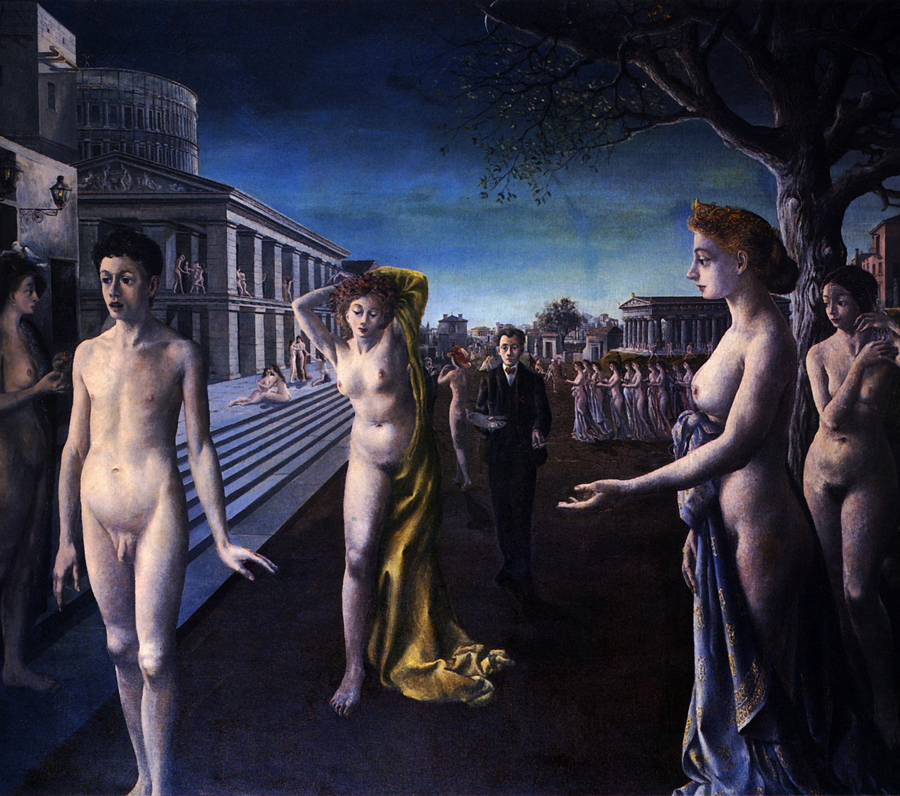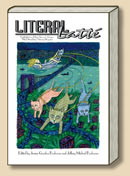Our town was like most other towns, strapped to the ground by sidewalks and streets, weighted by grey buildings, and tramped down by an allotropic populace, of people and their various permutations. This was perhaps our town’s most treasured virtue, the stimulus to its many civic innovations — the simultaneous coexistence of so many people in so many forms: dopplegangers, pseudonyms, false faces, transferences, memories and recollections. In our town all phases, tenses, histories, and incarnations existed unfettered by real or moral rigidity. Ours was a free city, a town of endless masquerades, a place of elegance and import. Illusionists of all varieties flourished here, conspiring in gravity-defying charades in which all the citizens were democratically complicitous. But we were not without lofty objectives: there were speeches and sermons and critical essays. We had grand ideas. Our ideals were Platonic, our methods Zeno’s: an infinity of half-measures and quartered thoughts, by which we approached asymptotically those concepts of civilization which we devoutly cherished. Ours was a town full of potential.

The Dawn of The Town (1940) by Paul Delvaux. Credit: WikiArt
Functionally, though, our town was indeed a civic ideal. With Cartesian prescience and precision we segregated our flowerings and moldings of culture, thus ensuring the shortest distance between rituals and guaranteeing the townspeople a certain comfortable forewarning. At any time in the day one was secure in his coordinates, and confident on proceeding to the next point. Thus, one could navigate the streets with only a minimal awareness, assured of safety, which thus fostered far more efficaciously than any overt public agenda at least the rudiments of introspection. Such a schema, of course, also presented the authorities with efficient means for the graphing of suspicious movements and, with the properly derived equations, extrapolating incidents. Those deemed contrary to the public good could be precluded in advance with the mathematical simplicity of division or subtraction.
Do not think our town bled of vitality, however, for the overseers of public good followed the complex laws of chaos, a fluid dynamics of population which did not smother but rather fueled the marvelous vortex of humanity which was our citizenry. For those desirous of a certain degree of personal, though not institutional, freedom (that is to say, uncertainty) special maps were freely available. These allowed one to experience the means and the end of uncircumspect behaviors at various levels of difficulty, according to one’s urges and capabilities. For example, one might wish to procure some particular companionship for an evening. This particular map would direct one to take such streets towards this objective as might subject one to mockery, robbery, or physical injury. In addition, it would delineate the appropriate corners, alleys, stairwells, at which were situated either subsidized, certified professionals, or the costlier unrated ones — these latter augmenting one’s degrees of freedom by the uncertainty of social diseases or arrest and scandal.
Shops disappeared overnight and new shops rose to the prominence of institutions within hours, only to fall quickly from the collective memory…
But this is much too sordid and esoteric, and too removed from the day to day enjoyments of the upstanding citizens of our town. We had an ease of living which we cherished, and reveled in the modernity that afforded us such tranquility — our leisurely elevators and our subterranean trains and our portable, expandable umbrellas. How we marveled at our cleverness, the wonderful duplicities of technology: a town of incorruptible materials, of prefabricated interiors of non-oxidizing metals and all-temperature plastics, surmounted by delicately handcrafted, decaying facades of old fashionable brick and stone.
And the people of our town — such a masquerade was its populace. Our town was full of life, of people in transit. Boisterous conventioneers and over-zealous travelers and upwardly mobile professionals, all who came, accomplished, and departed. Tourists were more than likely to stop and ask directions of other tourists, or apprentice citizens who had yet to familiarize themselves. The perpetual demographic flux in fact had led to localized physical instabilities by putting an incredible strain on the local tradesmen, for no one was ever here long enough to develop habits and traditions of purchasing. As a consequence shops disappeared overnight and new shops rose to the prominence of institutions within hours of patronage, only to fall quickly from the collective memory, neglected by the newest faces, then frequented briefly until closure by the people of the street whose faces never changed. Because of this mutability, one was always entering the wrong establishment, only to shrug and settle in, becoming at once and for the time being one of the established clientele who lent character to the place.
Such transience gave to the town a tenuous reality, like that of a patient with some rare memory disorder who every day had to reinvent the present. Day after day we performed the ritual of making new oldest friends and discovering new favorite places where we have always gone. To compensate for this metastable condition, the people of the town took to calling individuals and establishments by the names of their previous incarnations. Of course, no one person and no one place necessarily had the same name for any two people. A postman might have as many names as a god, and the neon bar at Circle Central on any given day might go by the names Cafe Mozart, Stefan’s, The Circle Cafe, and La Belle Époque. It was not uncommon on thick and testy nights for brawls to erupt like quickly moving thunderstorms, punctuating the languorous indolence of the town’s evening with shouts and drunken kicks as patrons vied to establish their own identity, for an establishment, a friend, themselves, over that of someone else.
But such incidents were fairly infrequent, or at least sufficiently localized and circumscribed that they seemed so. Ours was a model town. There shimmered about our town an enlightened respectability that some civic psychologist might well attribute to the vagrancy of the populace, for this rootless illegitimacy we counteracted with a systematized mediocrity which was the most precisely choreographed averaging of moral extremes. Breakthroughs and failings, revelations and scandals, were planned to the last bankruptcy, slander suit, and governmental inquiry; heroic rescues, philosophical insights, and sporting outcomes were rehearsed for the proper ambiance that expectations in a city of tenuous, dubious reality, demanded — to be more real than real. With only the facade of buildings immutable from year to year, with their insides prey to the renovations of each season’s new faces and fads, with even the nature of the town under precise regulation, with newer and more exotic plants suddenly appearing in the circles, surreptitiously depotted in midnight’s heliotropic pause without regard to natural season or indigenous flora, with the populace just an abstract equilibrium, in short, with no external constancy and no social heredity, reality here was a myth. To give the illusion of everyday to this incessant novelty required such logistics as required an Office of Public Constancy. Nothing was left to chance, save where appropriate.
But any pretenses of a firm and secure reality were only maintained for the benefit of tourists and visiting business people and dignitaries. Ours was a liberated town, dizzy in its unique freedom from the constraints of the past. Without established officers, without longstanding newspaper editors, gadflies and muckrakers, or anything more than a veneer of constituency, there was no incentive to lay foundation to a collective memory and history. There was no mechanism, and no public outcry for such, for insuring any integrity and coherence to previous decrees and initiatives. The meanings of words and events — particularly for government officials, who tend to be the most at ease in their freedom — became unfettered from each other. No public official felt the least compunction in exchanging words with their antonyms, in citing in their defense of some partisan proposal the accomplishments or eloquent speeches of some hero of the opposing party, or in proceeding in a direction contrary to that grandstanded.
Although erasing the delineations between people, things, and events could be complicating in the short run, in the long run this greatly simplified decision-making in all aspects of life. With no distinctions between candidates or products, one could casually choose without forethought, without later being plagued by regret or apprehension. Where black was white and vice-versa, everything tended to grey, which is a very elegant and expedient color.
And so our town flourished: solid grey buildings and people and ideas. And although fickle in their temporal commitment to its physicality, the many ex-inhabitants of our town were constant in their devotion to it in the abstract — to the metastable, grey reality which endowed each citizen, bricklayer or leader, with a vertiginous freedom to shape the world in his or her own image.
Ours was a town everyone remembered living in with great fondness.
